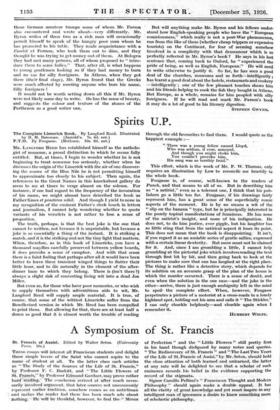Spirits U.P.
Mn. LANGFORD REED has established himself as the antholo- gist of nonsense, a proud distinction to which he seems fully entitled. But, at times, I begin to wonder whether he is not beginning to treat nonsense too seriously, whether when he discusses the origin of the Limerick with the air of one discover- ing the source of the Blue Nile he is not permitting himself to approximate too closely to his subject. Then again, the references to the Great Names in this knockabout gallery do
seem to me at times to verge almost on the solemn. For instance, if one had regard to the frequency of the invocation of his name, we might almost have degeribed the book as -- Father Knox et praeterea nihil. And though I yield to none in my recognition of the eminent Father's sleek touch in letters and journalism, I cannot help wondering whether to quote variants of his verselets is not rather to lose a sense of proportion.
The truth, perhaps, is that the best joke is the one that cannot be written, not because it is unprintable, but because a joke; is so essentially a thing of the instant. It is striking a
match, and ifis the striking and not the tiny light that matters. When, therefore, as in this book of Limericks, you have a
thousand mayflies carefully preserved between yellow hoards; it does provoke a sense of camphor. ' And with that sense there is a faint feeling that perhaps after all it would have been better to leave these transient winged things to flutter their little hour, and to die naturally in the element of the after- dinner haze to which they belong. There is (isn't there ?) always a slight risk of converting living wit' into a dead Joe Miller.
But even so, for those who have poor memories, or who wish to supply themselves with adientitious aids to wit, Mr. Langford Reed will supply ample material. It is true, of course, that some of the wittiest Limericks suffer from the Bowdlerized version in which Mr. Reed has been compelled to print them. But allowing for that, there are at least half a dozen so good that it is almost worth the trouble of reading through the old favourites to find them. I would quote as the happiest example :—
" There was a young fellow named Lloyd, Who was seldom, if ever, annoyed. And though you might choke him, You couldn't provoke him, - His sang was so terribly froid."
This effort, which' is the work of Mr. F. W. Thomas, only requires an illustration by Low to reconcile me heartily to the whole book.
Fougasse is, of course, well-known to the readers of Punch, and that means to all of us. But in describing him as " a satirist," even as a tolerant one, I think that his pub- lishers go a little too far. Fougasse; if his drawings fairly represeht him; has a great sense of the superficially comic aspects of the moment. He is by no means a wit of the " slip on the banana " type, but he is principally interested in the purely topical manifestations of funniness. He has none of the satirist's insight, and none of his indignation. He does not, to do him justice, ever giggle, but his laughter has so little sting that from the'satirical aspect it loses its point. This does not mean that the book is disappointing. It isn't, if you regard it as an amiable series of gentle sallies; expressed with a certain linear dexterity. But more must not be claimed
for it. And, since I am grumbling a little, I cannot help grumbling at the pictorial joke which involves reading the text
through first bit by bit, and then going back to look at the pictures to make sure that one has laughed at the right place. The thing is rather like a detective story, which depends for its sohition on an accurate grasp of the plan of the house in which the murder occurred. There is a sense of doubt, and even when the solution in the one ease—and the joke in the other—arrive, there is just enough ambiguity left in the mind to spoil- the complete effect. When, however, Fougasse perpetrates a picture of a motorist at a cross-roads in s lonely highland spot, holding out his arm and calls it " The-Stickler," I can only chuckle helplessly—and chuckle again when I
remember it. HUMBERT WOLFE.


































 Previous page
Previous page